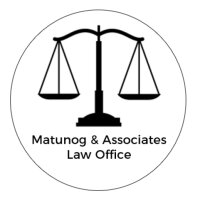Best Mining Law Lawyers in Davao City
Share your needs with us, get contacted by law firms.
Free. Takes 2 min.
List of the best lawyers in Davao City, Philippines
About Mining Law in Davao City, Philippines
Mining Law in Davao City, and the rest of the Philippines, encompasses the legal regulations and procedures governing exploration, development, and utilization of mineral resources. Like other regions, Davao City abides by national mining laws, notably the Philippine Mining Act of 1995 (Republic Act No. 7942), with supplementary ordinances shaped by the local government. Mining operations range from large-scale ventures to small-scale community mining, covering minerals like gold, copper, and other valuable resources. Given Davao City’s rich natural environment and strict environmental policies, mining activities face careful local scrutiny to balance economic benefits with sustainability and indigenous rights.
Why You May Need a Lawyer
Mining activities are highly regulated and often complex, involving numerous government agencies and compliance obligations. You may need a lawyer if you are:
- Applying for or renewing mining permits or licenses
- Negotiating joint venture agreements with local or foreign partners
- Involved in disputes over mining claims or boundaries
- Facing environmental compliance issues or penalties
- Encountering conflict regarding ancestral domain or indigenous peoples’ rights
- Challenging government decisions on mining operations
- Seeking due diligence before investing in mining projects
- Responding to local ordinances affecting ongoing mining activities
A local mining lawyer can guide you through these processes, defend your interests, and help you understand your legal obligations under current laws and regulations.
Local Laws Overview
Mining Law in Davao City is governed mainly by the Philippine Mining Act of 1995, with implementation by the Department of Environment and Natural Resources (DENR) and its bureaus. Some key aspects include:
- Permitting: All mining activities require permits, such as Exploration Permits, Mineral Production Sharing Agreements (MPSA), or Small-Scale Mining Permits. DENR and the Mines and Geosciences Bureau process these applications at the national and regional levels, sometimes with clearance from local government units.
- Environmental Compliance: Mining operators must secure an Environmental Compliance Certificate (ECC) before operations. Regular monitoring, impact assessments, and rehabilitation plans are mandatory.
- Local Government Role: Davao’s local government exercises additional regulatory functions, such as zoning and issuing local ordinances. For example, Davao City has ordinances strictly regulating or banning certain types of mining to protect watershed areas.
- Indigenous Peoples’ Rights: Compliance with the Indigenous Peoples Rights Act (IPRA) is required if mining activities affect ancestral domains, including the Free, Prior, and Informed Consent (FPIC) process.
- Conflict Resolution: Disputes over claims, environmental impacts, and community relations may be resolved through administrative proceedings or court litigation.
Understanding both the national and local frameworks is essential for lawful and productive mining activity in Davao City.
Frequently Asked Questions
What laws govern mining in Davao City?
The Philippine Mining Act of 1995 is the primary law, supplemented by local ordinances and environmental laws. Permits and monitoring are overseen by DENR and the City Government.
Who can apply for mining rights in Davao City?
Both Filipino citizens and corporations with at least 60 percent Filipino ownership may apply for mining permits. Foreign entities can enter joint ventures under certain conditions.
Are there any areas in Davao City where mining is not allowed?
Yes, certain protected areas, watersheds, and ancestral domains may prohibit or strictly regulate mining activities according to local ordinances and national legislation.
What is an Environmental Compliance Certificate (ECC)?
An ECC is an authorization from DENR certifying that a proposed project will not cause significant negative environmental effects. Securing an ECC is mandatory before starting mining operations.
How do indigenous rights affect mining projects?
If mining operations affect ancestral lands, operators must consult with indigenous communities and obtain their Free, Prior, and Informed Consent (FPIC) as required by law.
How are mining disputes resolved?
Disputes can be resolved via administrative proceedings through the Mines and Geosciences Bureau, or through court cases if needed.
Are there penalties for illegal mining?
Yes, illegal mining can result in fines, imprisonment, confiscation of equipment, and a ban from future mining activities.
Can small-scale miners operate legally?
Yes, but they must secure a Small-Scale Mining Permit and comply with both environmental and safety regulations.
Does the local government regulate mining directly?
The local government enforces zoning, environmental measures, and local ordinances that can either restrict or support mining, in coordination with national agencies.
What steps should I take to start a mining project in Davao City?
You should consult a mining lawyer, conduct due diligence, identify the location, secure permits from DENR and the local government, and comply with environmental and community requirements.
Additional Resources
For more information or support on Mining Law, consider reaching out to these resources:
- Department of Environment and Natural Resources (DENR) - Region XI: Handles permits, environmental compliance, and monitoring.
- Mines and Geosciences Bureau (MGB) - Region XI: Provides technical guidance, application forms, and dispute resolution services.
- Davao City Government - City Environment and Natural Resources Office (CENRO): Issues local clearances and monitors local ordinance compliance.
- National Commission on Indigenous Peoples (NCIP): Handles FPIC and ancestral domain clearances for projects affecting indigenous communities.
- Integrated Bar of the Philippines (IBP) Davao Chapter: Offers lawyer referrals and basic legal assistance.
Next Steps
If you need legal assistance with Mining Law in Davao City:
- Gather all documents related to your mining activity, such as titles, maps, and communications with government offices.
- Request an appointment with a lawyer specializing in mining or environmental law. Prepare questions about your rights, obligations, and timelines.
- Contact local regulatory bodies (DENR, MGB, CENRO) to inquire about permit requirements and procedures.
- If your activities may affect indigenous land, approach NCIP early to facilitate FPIC consultation.
- Stay informed about both national laws and current local ordinances in Davao City.
Legal compliance is key to the sustainable and lawful development of mining projects. Engaging a qualified local lawyer can help you navigate the process efficiently and avoid costly mistakes.
Lawzana helps you find the best lawyers and law firms in Davao City through a curated and pre-screened list of qualified legal professionals. Our platform offers rankings and detailed profiles of attorneys and law firms, allowing you to compare based on practice areas, including Mining Law, experience, and client feedback.
Each profile includes a description of the firm's areas of practice, client reviews, team members and partners, year of establishment, spoken languages, office locations, contact information, social media presence, and any published articles or resources. Most firms on our platform speak English and are experienced in both local and international legal matters.
Get a quote from top-rated law firms in Davao City, Philippines — quickly, securely, and without unnecessary hassle.
Disclaimer:
The information provided on this page is for general informational purposes only and does not constitute legal advice. While we strive to ensure the accuracy and relevance of the content, legal information may change over time, and interpretations of the law can vary. You should always consult with a qualified legal professional for advice specific to your situation.
We disclaim all liability for actions taken or not taken based on the content of this page. If you believe any information is incorrect or outdated, please contact us, and we will review and update it where appropriate.









